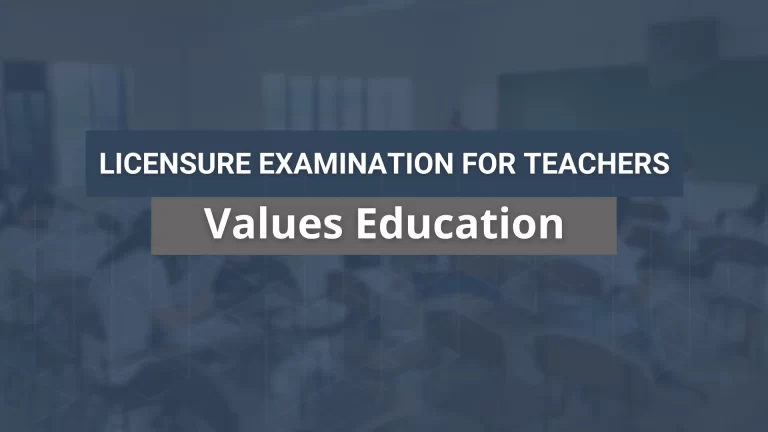This is the Multiples Choice Questions Part 5 of Values Education. In preparation for the LET Exam, practice, and familiarize every question we have, it might be included in the actual examination. Good luck.
Be fully prepared for your exam, follow our tips on effective studying and test-taking strategies. Click here to read the tips:
Values Education Part 5
1. Our will is to come the fullest love the supreme goodness which is called:
a. Animal
b. Universal
c. Man
d. God
Answer: d
2. Values Education seeks to form the spiritual faculties of the INTELLECT whose function, purpose, goal and the highest human fulfillment is called:
a. To acknowledge, internalize and uphold wisdom
b. To think and to choose goodness and virtue
c. To think and know truth and wisdom
d. None of the above
Answer: c
3. Values Education seeks to form the spiritual faculties of the WILL whose function, purpose, goal and highest human fulfillment is:
a. To control, fell, direct and understand
b. To do/ act, to choose/love, goodness and virtue
c. To know, decide and act for the common good
d. None of the above
Answer: b
4. If a person believes she has the right over her own body and therefore, believes her unborn child can be aborted?
a. She does not violate anything
b. She if expressing moral values
c. She is expressing behavioral values
d. The decision is but normal, it is acceptable in other countries
Answer: b
5. A type of justice among equals which demands respects for the property or reputation of others to ensure solidarity and fellowship among men is:
a. Commutative
b. Legal justice
c. Social justice
d. Distributive
Answer: a
6. Television is an ally of education on values when:
a. It only entertain the viewer
b. It foster and concepts all opinions
c. It encourage several patrons and sponsors
d. It is placed at the service of man through objective and truth
Answer: d
7. The objective of the intellect is:
a. Goodness
b. Truth
c. Love
d. Understanding
Answer: b
8. In the education of values, it is important to establish the child’s emotional stability and self-confidence. This could be best achieved through:
a. Ambivalent child
b. Authoritarian child
c. Authoritative child
d. Permissive child
Answer: c
9. The following are the expected scope of the values education teaching learning process except one:
a. Involves not just cognitive but all the faculties of the learner
b. The learner conforms to the ideas and opinions of the majority
c. One learners value the way children learn things from their parents
d. Has direct and immediate relevance to the personal life of the learner
Answer: b
10. As a rational organism, man acquires knowledge of the universal truth through the intellect in three steps:
a. Cognition, imagination and memory
b. Observation, reasoning and judgement
c. Reasoning, apprehension, judgement and reasoning
Answer: c
11. A more general summative evaluation of a values development program should be carried out because:
a. Values cannot be develop as easily as cognitive skills
b. The immediate outcome is more important than its long term effects
c. Behavior indicators are apparent after a relatively long period of time
d. It facilities testing and measurement which provide data for further development
Answer: c
12. Continuous exposure of Filipinos to foreign TV programs result in:
a. The implanting of basic values
b. The domination of ruling class
c. The cultural penetration and influences
d. The transmission of foreign messages
Answer: c
13. The exposure of Filipinos to foreign TV programs result in:
a,. The implanting of basic values
b. The domination of ruling class
c. The cultural penetration and influences
d. The transmission of foreign messages
Answer: c
14. The interaction an individual experiences, acquires and learn from his family, his church, the school and other social helps him to:
a. Be consistent in his attitudes and actions
b. Adopt moral beliefs, attitudes and values
c. Stand for the hard right against the easy wrong
d. Discover his character in the choice of life wants to live
Answer: b
15. A value is said to be a powerful emotional commitment when:
a. It can be used explicitly to judge the worth of things
b. People care deeply about the things that they value
c. It contains ideas about two or more conflicting desires
d. It is supported by feelings of sympathy
Answer: b
16. If values are associated with past experiences or with persons whom those experiences were encountered they are:
a. Hierarchical
b. Subjective
c. Transmitted
d. Relative
Answer: b
17.Exponents of values define value as the stance that the self takes to the world through the feelings, ideas, imagination and:
a. Emotional expressions
b. Internalization
c. degrees of importance
d. behavior of the individual
Answer: b
18. The goal of values education in the Philippines is to provide and promote values at all three levels of the education system for the development of the human person committed to:
a. An abiding faith in God as a reflection of spirituality
b. The development of sense of nationalism
c. The development of cultural values
d. Building just and human society
Answer: d
19. The concept that everything is connected top everything else refers to:
a. Sharing and involvement
b. Interdependence
c. Collective effort
d. Harmony in diversity
Answer: b
20. Significant role models strongly influence the values of our young positively or negatively. Who among the following have generally the greatest influence on the young?
a. Favorite book characters
b. Teachers
c. Actor/ actress idols
d. Parents
Answer: d


